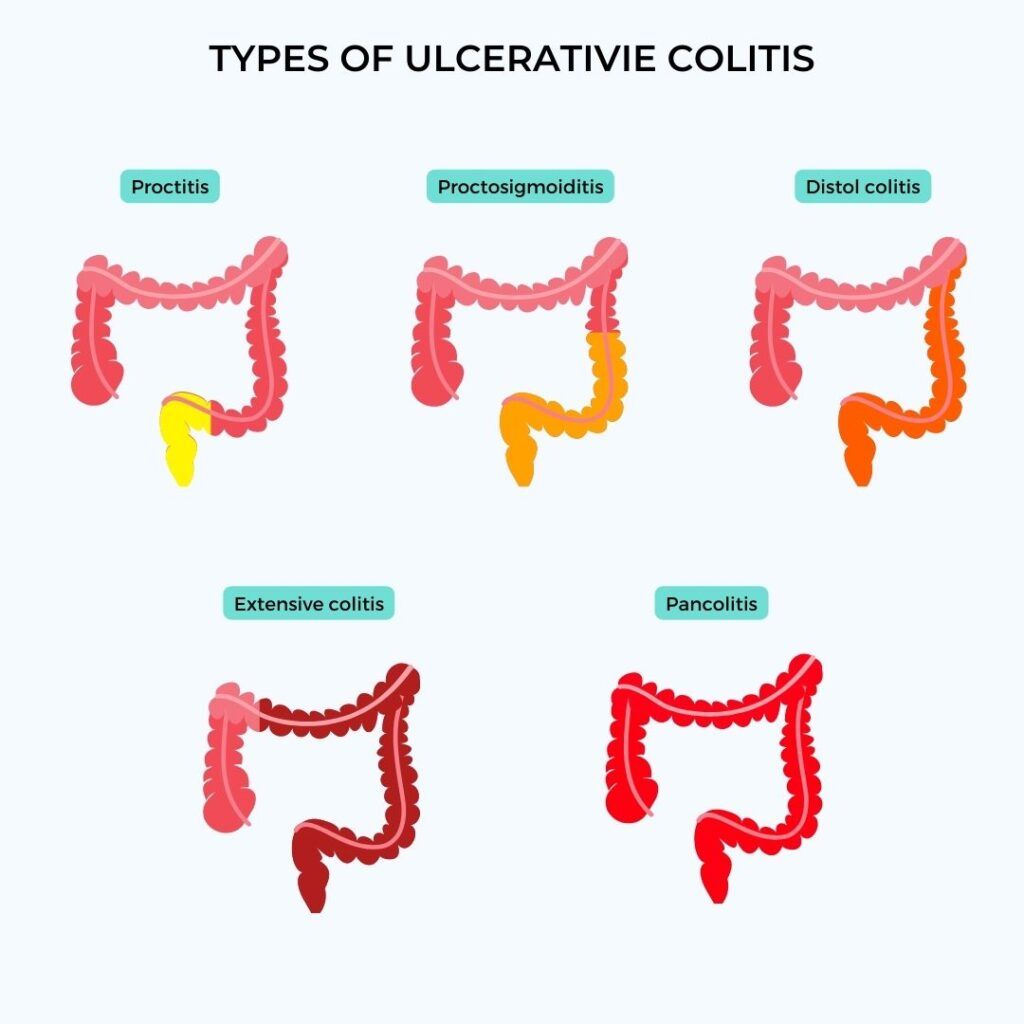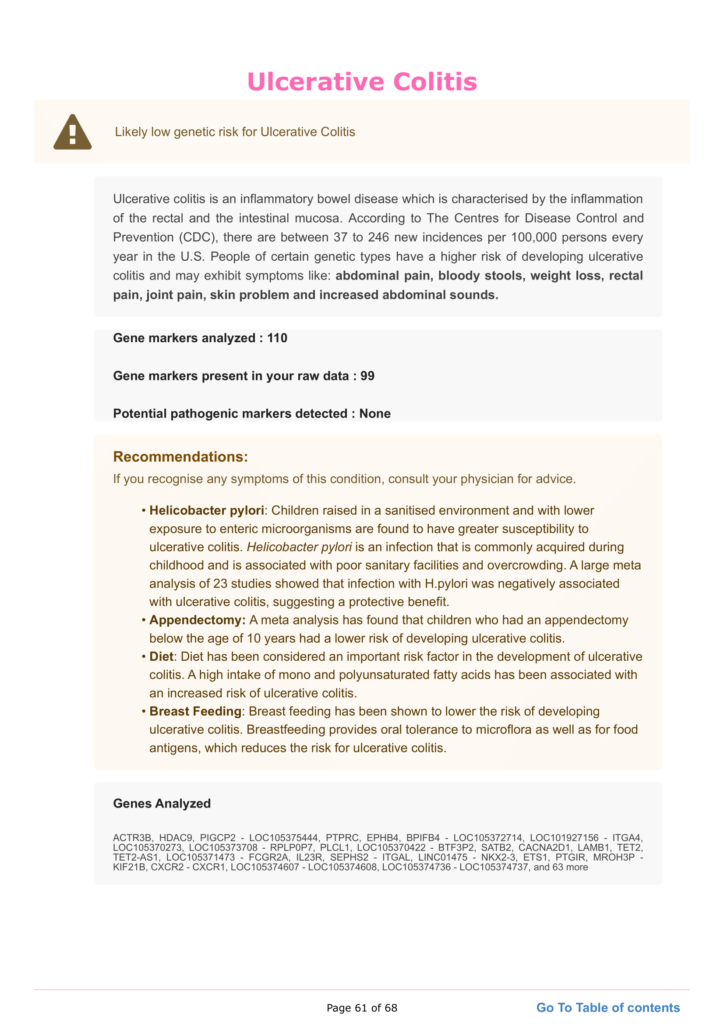Xcode Life's Genetic Ulcerative Colitis DNA Report
Researchers have identified several genes associated with ulcerative colitis.
In the sample report below, we've attempted to analyze some important genes that increase the risk of ulcerative colitis.
You can identify your genetic risk of ulcerative colitis by using your 23andMe DNA data and placing an order for the Gene Health Report.
Ulcerative Colitis: An Overview
Ulcerative colitis is a chronic condition of the digestive system. It is characterized by abnormal inflammation of the inner layer of the colon and the rectum.
This inflammation in ulcerative colitis often results in ulcers in the large intestine.
It is said to be a type of inflammatory bowel disease (IBD) and is most common in North America and Western Europe.
Anyone can develop ulcerative colitis, but it is more common in people between 15 and 30 years of age.
People with ulcerative colitis experience flare-ups several times throughout their lifetime.
Causes and Symptoms of Ulcerative Colitis
Causes
The exact cause of ulcerative colitis is unknown, but doctors and researchers believe the condition develops due to a complex interplay of several factors.
A few common causes of ulcerative colitis include:
- Genes
Since ulcerative colitis does run in families, researchers suggest that some genes may increase an individual’s risk of developing this condition.
- Abnormal immune reactions
Abnormal immune system reactions may lead to inflammation of the large intestine and may be responsible for ulcerative colitis in some individuals.
- Gut microbiome
The microbes that live in the digestive tract, including bacteria, viruses, and fungi, help digestion and constitute the gut microbiome.
Studies have found that a disruption or abnormal change in the gut microbiome can result in IBDs like ulcerative colitis.
- Environment
A complex interplay between an individual’s environment and how their body reacts to it may play a role in the development of ulcerative colitis.
However, further research is underway to understand how people’s genes, immune system, and gut microbiome interact with the environment to cause ulcerative colitis.
Symptoms
The symptoms of ulcerative colitis can vary among individuals.
A few common symptoms include:
- Persistent tummy pain
- Recurring diarrhea that may contain blood, pus, or mucus
- The frequent urge to empty your bowels
- Weight loss
- Loss of appetite
- Fatigue and extreme tiredness
The severity of the symptoms is directly related to the degree of inflammation of the rectum and the colon.
In some individuals, the severity of the inflammation may interfere with their regular routines and lives.
Ulcerative colitis is known to flare up and go into remission several times during an individual’s lifetime.
Common symptoms of a flare-up include:
- Oral ulcers
- Painful, red, or swollen skin
- Irritation in the eyes
- Painful and swollen joints (arthritis)
- Shortness of breath
- Fast or rapid heartbeat
- A rise in body temperature (fever)
- Increased blood in the stools
Types Of Ulcerative Colitis

Is Ulcerative Colitis Genetic?
Recent studies have identified several genes that may be linked to ulcerative colitis, but their exact roles still need to be understood.
Ulcerative colitis is thought to occur due to changes in the protective lining of the intestine or by an abnormal immune reaction, both of which occur due to genetic variations.
So, few genes involved are associated with the protective function of the intestinal lining, while others protect the body’s tissues from bacterial toxins.
A few abnormal genetic changes (mutations) may also cause the immune system to malfunction, resulting in chronic inflammation and ulcerative colitis.
Is There An Ulcerative Colitis Gene?
Though there is no single ulcerative colitis gene, a few that have been associated with this condition include;
- IL23R
- IRF5
- ABCB1
- IL10RA
- IL10RB
- PTPN2
Of these, two genes that are of particular interest are IL23R and IRF5.
- IL23R
This gene provides instructions for making a protein called interleukin 23 receptor (IL-23).
This protein is present on the outer surface of immune system cells, including the T cells, and participates in defending the body against foreign substances.
The IL23R protein is also responsible for inflammatory reactions and is said to play a role in the development of ulcerative colitis.
- IRF5
Interferon regulatory factor 5 (IRF5) gives instructions for making the IRF5 protein.
This protein regulates proteins called cytokines, which participate in inflammatory immune reactions.
This gene may have a role to play in the development of ulcerative colitis.
How’s Ulcerative Colitis Inherited?
The inheritance pattern of ulcerative colitis is unknown as many genetic and environmental factors are involved in its development.
However, having a family member, especially first-degree relatives, increases one’s risk of developing the condition.
Other Risk Factors For Ulcerative Colitis
Many factors can increase the risk of developing ulcerative colitis or cause a flare-up in people with the condition.
While factors like age and genes cannot be modified, lifestyle changes can help control and prevent the condition.
Here are a few common risk factors for ulcerative colitis:
- Age: People below 30 years are at an increased risk of developing the condition.
- Race: Caucasians and people of Ashkenazi Jewish descent are at a higher risk for ulcerative colitis.
- Genetics: People with a family history of ulcerative colitis are at a greater risk.
- Environmental factors: Exposure and immune system reaction to environmental agents like bacteria and chemicals can trigger an uncontrolled inflammatory reaction in the digestive system, resulting in ulcerative colitis.
- Lifestyle: Though less common, consuming polyunsaturated fatty acids may contribute to ulcerative colitis.
Other factors associated with ulcerative colitis include a sedentary lifestyle and smoking.
- Stress: Though not scientifically proven, stress may be a risk factor for developing ulcerative colitis and causing a flare-up.
Having a risk factor does not mean one will develop the condition.
Summary: Is Ulcerative Colitis Genetic?
- Ulcerative colitis is a chronic inflammatory condition of the digestive system common in people between 15 and 30 years.
- Though the exact cause of ulcerative colitis is unknown, genes, ethnicity, gut microbiome, and environmental factors play a role in its development.
- Frequent tummy pain, recurrent diarrhea, urge to empty bowels, and weight loss is common symptoms of ulcerative colitis.
- Though several genes like IL23R, IRF5, and others have been associated with ulcerative colitis, what these genes do is still unknown.
- While ulcerative colitis runs in families, its exact inheritance pattern remains unclear.
References
- https://www.nhs.uk/conditions/ulcerative-colitis/causes/
- https://medlineplus.gov/genetics/condition/ulcerative-colitis/
- https://www.healthline.com/health/is-ulcerative-colitis-hereditary#triggers
- https://www.ncbi.nlm.nih.gov/pmc/articles/PMC4133528/
- https://www.uhhospitals.org/services/Digestive-health-services/Conditions-and-treatments/small-and-large-intestine/ulcerative-colitis
- https://medlineplus.gov/genetics/gene/il23r/#conditions
- https://medlineplus.gov/genetics/gene/irf5/#conditions
- https://www.niddk.nih.gov/health-information/digestive-diseases/ulcerative-colitis/symptoms-causes







